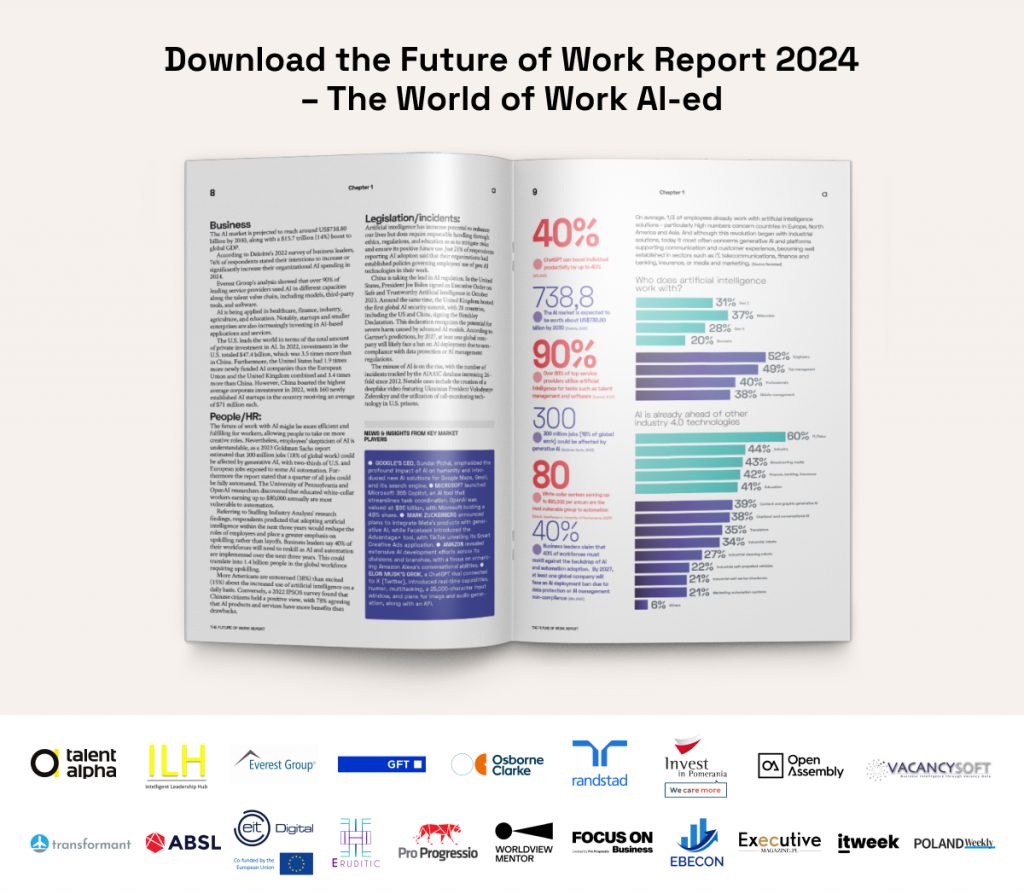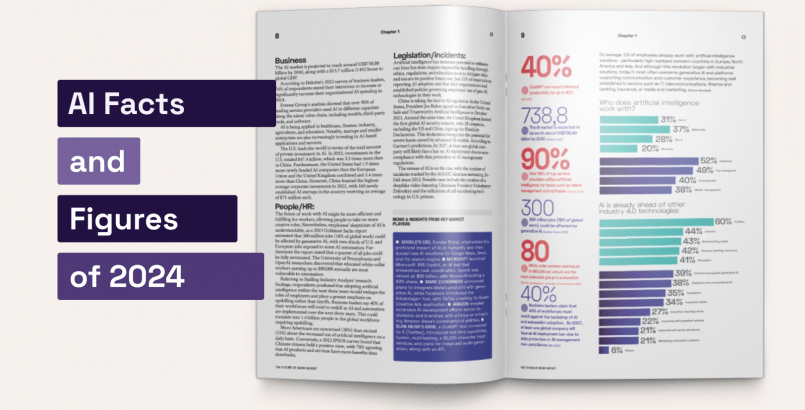Artificial Intelligence (AI) is becoming the cornerstone of our everyday lives, revolutionizing every aspect from industry and medicine to education and entertainment. In the following article, you will find some important facts and figures showcasing the impact of artificial intelligence on our society and economy.
Business:
The AI market is projected to reach around US$738.80 billion by 2030, along with a $15.7 trillion (14%) boost to global GDP.
According to Deloitte’s 2022 survey of business leaders, 76% of respondents stated their intentions to increase or significantly increase their organizational AI spending in 2024.
Everest Group’s analysis showed that over 90% of leading service providers already used AI in different capacities along the talent value chain, including models, third-party tools, and software.
AI is being applied in healthcare, finance, industry, agriculture, and education. Notably, startups and smaller enterprises are also increasingly investing in AI-based applications and services.
The U.S. leads the world in terms of the total amount of private investment in AI. In 2022, investments in the U.S. totaled $47.4 billion, which was 3.5 times more than in China. Furthermore, the United States had 1.9 times more newly funded AI companies than the European Union and the United Kingdom combined and 3.4 times more than China. However, China boasted the highest average corporate investment in 2022, with 160 newly established AI startups in the country receiving an average of $71 million each.
90% of companies that participated in the latest Talent Alpha’s Tech Business Survey 2024 predicted that AI will have a positive impact on the growth of the IT sector and planned to utilize it in various fields of business.

People/HR:
The future of work with AI might be more efficient and fulfilling for workers, allowing people to take on more creative roles. Nevertheless, employees’ skepticism of AI is understandable, as a 2023 Goldman Sachs report estimated that 300 million jobs (18% of global work) could be affected by generative AI, with two-thirds of U.S. and European jobs exposed to some AI automation Furthermore the report stated that a quarter of all jobs could be fully automated. The University of Pennsylvania and OpenAI researchers discovered that educated white-collar workers earning up to $80,000 annually are most vulnerable to automation.
Referring to Staffing Industry Analysts’ research findings, respondents predicted that adopting artificial intelligence within the next three years would reshape the roles of employees and place a greater emphasis on upskilling rather than layoffs. Business leaders say 40% of their workforces will need to reskill as AI and automation are implemented over the next three years. This could translate into 1.4 billion people in the global workforce requiring upskilling.
More Americans are concerned (38%) than excited (15%) about the increased use of artificial intelligence on a daily basis. Conversely, a 2022 IPSOS survey found that Chinese citizens held a positive view, with 78% agreeing that AI products and services have more benefits than drawbacks.
According to the Tech Business Survey 2024 – AI remains a controversial topic, some feared resistance from both sides – employees and customers in particular (16% in both cases).
Legislation/incidents:
Artificial intelligence has immense potential to enhance our lives but does require responsible handling through ethics, regulations, and education so as to mitigate risks and ensure its positive future use. Just 21% of respondents reporting AI adoption said that their organizations had established policies governing employees’ use of gen AI technologies in their work.
China is taking the lead in AI regulation. In the United States, President Joe Biden signed an Executive Order on Safe and Trustworthy Artificial Intelligence in October 2023. Around the same time, the United Kingdom hosted the first global AI security summit, with 28 countries, including the US and China, signing the Bletchley Declaration. This declaration recognizes the potential for severe harm caused by advanced AI models. According to Gartner’s predictions, by 2027, at least one global company will likely face a ban on AI deployment due to non-compliance with data protection or AI management regulations.
In March 2023, the European Parliament passed the Artificial Intelligence Act. These fresh regulations aim to establish a legal environment that fosters AI development while safeguarding human rights and reducing discrimination. Organizations currently encounter the challenge of adapting to and leveraging AI’s potential.
The misuse of AI is on the rise, with the number of incidents tracked by the AIAAIC database increasing 26-fold since 2012. Notable cases include the creation of a deepfake video featuring Ukrainian President Volodymyr Zelenskyy and the utilization of call-monitoring technology in U.S. prisons.
If you’re thinking about using AI in your business, read the Future of Work Report 2024 – “The World of Work AI-ed”


Read also
Can AI be as Creative as Humans?
AI in Tech Business Survey 2024
According to Talent Alpha’s study, 90% of companies believe that AI will help them and the whole IT sector grow. How do they utilise artificial intelligence in their businesses?
Artificial Intelligence in Business
AI is revolutionizing the way companies operate. Discover the ways in which AI has rapidly become indispensable in our new blog.